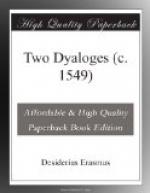people. Bea. A gentylman and why or to what
entent and purpose a gentylman? Boni. It
is a straunge thynge to be spoken howe moche they
thynke it is mete for a gentylman or a horseman
to take vpon hym. Bea. By what equytie, authoritie,
or lawes. Boni. By none other but by the
selfe same lawes that the Admiralles of the ||sees
chalenge a proprietie in all suche thynges as are
cast vpon the shoore by wracke, althoughe the ryghte
owner come forthe and chalenge his owne goodes.
And also by the same lawes that some other men saye
all is theyrs what soeuer is founde aboute a thefe
or a robber whe he is take. Boni. Such lawes
as these are the arrantest theues that are myght
make them selues. Bea. yea and ye may be
sure they wold gladly with al theyr harts i their
bodies make suche lawes yf they coulde mayntayne
them or were of power to se them executed, and they
myght haue some thynge to laye for theyr excuse
if they could proclayme opyn warre before they fell
to robbynge. Boni. But who gaue that pryuylege
rather to a horseman then to a foteman, or more
to a gentylman the to a good yeman. Bea.
The fauoure that is shewed to men of warre, for
by suche shyftes and thus they practyse before to
be good men of warre that they ||maye be more redy
& hansome to spoyle theyr enemyes when they shall
encounter with the. Boni. I thynke Pyrhus
dyd so exercyse and breake his yonge souldyers to
the warres. Bea. No not Pyrrhus but the Lacedemonians
dyd. Boni. Mary syr hange vp suche practysers
or soldyers and theyr practisyng to. But howe
come they by the name of horsemen or gentylmen that
they vsurpe suche a great prerogatyue? Bea.
Some of them are gentylme borne and it cometh to
them by auncestrie, some bye it by the meanes of
maystrys money, and other some gette it by certayne
shyftes. Boni. But maye euery man that wyl
and lyst come by it by shyftes? Bea. Yea
why not, euery man maye be a gentylman nowe adayes
very well and yf theyr condicions and maners be
accordynge. Boni. What maners or condicions
must suche one haue I beseche the? Bea. Yf
he be occupyed aboute no goodnesse, yf he can ruffle
it ||and swashe in his satens and his silkes and
go gorgiously apparelled, yf he can ratle in his
rynges vpon the fyngers endes, yf he can playe the
ruffyan and the horemonger and kepe a gaye hoore
gallantlye, yf he be neuer well at ease but when
he is playenge at the dyse, yf he be able to matche
as moche an vnthryfte as hym selfe with a newe payre
of cardes, yf he spende his tyme lyke an epycure
vpon bankettinge, sumptuous fare, and all kynde
of pleasures, yf he talke of no rascalles nor beggars,
but bragge, bost, face, brace, and crake of castelles,
towers, and skyrmysshes, and yf all his talke be
of the warres and blody battels, and playe the parte
of crackinge Thraso throughly, such gaye grekes,
lusty brutes and ionkers may take vpon them to be
at defyaunce withe whome they wyll and lyst, thoughe




